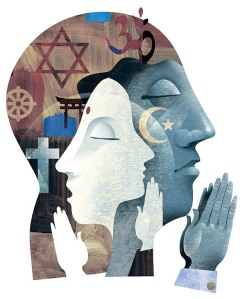
My absence has been wholly due to one word: ‘love’. Yes, folks. Since my last post I’ve been pretty busy falling in it, getting married in it, building a house in it, and other things that seem contrary to the very word, in the name of love.
Yes love, or should I say romance. To be quite honest with you I didn’t experience the difference between the two until I got ‘hitched’ back in January. It was really romantic and I swore at that moment that everything felt perfect. We closed the ceremony with the blessing of Holy Matrimony. It felt ‘Holy’. I Agreed. Well…I can tell you now that I really didn’t know what to expect.
Let’s face it. Marriage today is a mess. But don’t take my word for it. Look at the stats…
The United States of America holds a divorce rate of 50%. That’s only the first marriage! The rates increase as you get older up to 70%!! It really begs the question: “Why even bother getting married!”
I have three reasons that I think can shed light on why it’s not working in America.
I. Marriage by the majority isn’t seen as ‘Holy’ anymore
Since this whole evolution thing, you’ve got no choice but to define marriage in evolutionary biological terms. So, looking in from that worldview, marriage is only seen as a means of procreation and power. Living in a group means stronger numbers and procreation to the max would create more potential for survival of the genes. Conflict in marriage leading to divorce or separation is totally a matter of the failure to adapt leading to extinction. I’m making this all based on a very thin knowledge of how I view marriage from an atheistic-evolutionist perspective.
My marriage was called ‘holy’. As a Christian I believe that God alone is holy. I can’t make anything holy. So this means that marriage belongs to God. Me and my wife are just mere participants in something God created. So, this pretty much means I have no power over marriage and my wife is my wife because God says so and I chose to accept it. So no matter how much I fuss or cuss in my marriage cause of whatever made me jealous (or selfish) at the end of the day she is always my wife and it’s God’s marriage. Not mine.
I really think the ‘holy’ factor missing is a serious problem for America because marriage is taken on the view that it’s his/hers or it’s mine. So we do it ourselves. When there’s a problem between spouses and we can’t handle it, we bail, take the quickest way out and move on. But avoiding conflict only leads to more conflicts that fail to be resolved. Now, I’m not saying there aren’t situations that are dangerous and serious protection needs to be sought out. Violence and life-threatening circumstances needs to be avoided. My point is simply that our marriage in it’s end result is a product woven by our own two hands because we made it in our own image and likeness and not after God. It’s not ‘holy’ its just what we are – all too human.
II. Pain has lost it’s purpose in marriage
 Marriage can bring the issue of pain like never before. Dishonestly, violence, and fear are some of the things plaguing the morals of society. What do you do when it’s coming from the person who sleeps right next to you? The natural impulse pain is to avoid it and rightly so! But in marriage divorce is the modern popular solution. I don’t think I need to explain this. You can look at the stats again get it from there. But there is good that comes out of pain as well. I study Taekwon-Do and I had to endure a lot of pain. Much of which was beneficial. I even suffered some bruises and a concussion. Ask me if I regret it? Not at all! I think, judging from my experience and what I see in my dojang (the Korean counter-part to dojo) that people will not endure any kind of pain if it is not for a purpose and one that they themselves desire.
Marriage can bring the issue of pain like never before. Dishonestly, violence, and fear are some of the things plaguing the morals of society. What do you do when it’s coming from the person who sleeps right next to you? The natural impulse pain is to avoid it and rightly so! But in marriage divorce is the modern popular solution. I don’t think I need to explain this. You can look at the stats again get it from there. But there is good that comes out of pain as well. I study Taekwon-Do and I had to endure a lot of pain. Much of which was beneficial. I even suffered some bruises and a concussion. Ask me if I regret it? Not at all! I think, judging from my experience and what I see in my dojang (the Korean counter-part to dojo) that people will not endure any kind of pain if it is not for a purpose and one that they themselves desire.
We know that marriage has pain, but no one comes into marriage expecting it or anticipating it to make them better. I got knocked out in Taekwon-Do and it taught me to keep my hands up when sparring; even with a white belt! I knew what to do with my pain – learn from it. But in marriage we’d like to think it as pain-free. Marriage is pretty much that place you go to where your always in love and you live in the castle with the princess happily ever after (with no concussions). Right? If this isn’t so, then why not expect pain? It’s because we don’t know what to do with it.
As a Christian, sin to me is as real as a strike to the head. So, even though marriage is holy and made by God, I still make mistakes and have a lot of proclivities in my life. Humans bring sin into marriage and…well you can just look at the stats again. My point is that with sin outside of the equation, we don’t know what to do with the pain caused in marriage and we end up just dumping it everywhere except where it matters. The Cross of Christ. We men resort to passive aggressive behavior, alcoholism, verbal and physical abuse, and late nights out of the house because we are paralyzed with pain. That pain we feel is telling us something is wrong in Gods marriage and we need to give it to Him. We might have never even of done it and that pain is a wake up call just like my concussion was a wake-up call to close my defenses properly. As a Christian, I am not to fix my marriage myself, but I’ve learned to ask God what needs to be done.
NEXT…III. Marriage is becoming increasingly Sexually Bankrupt – Pt.2




